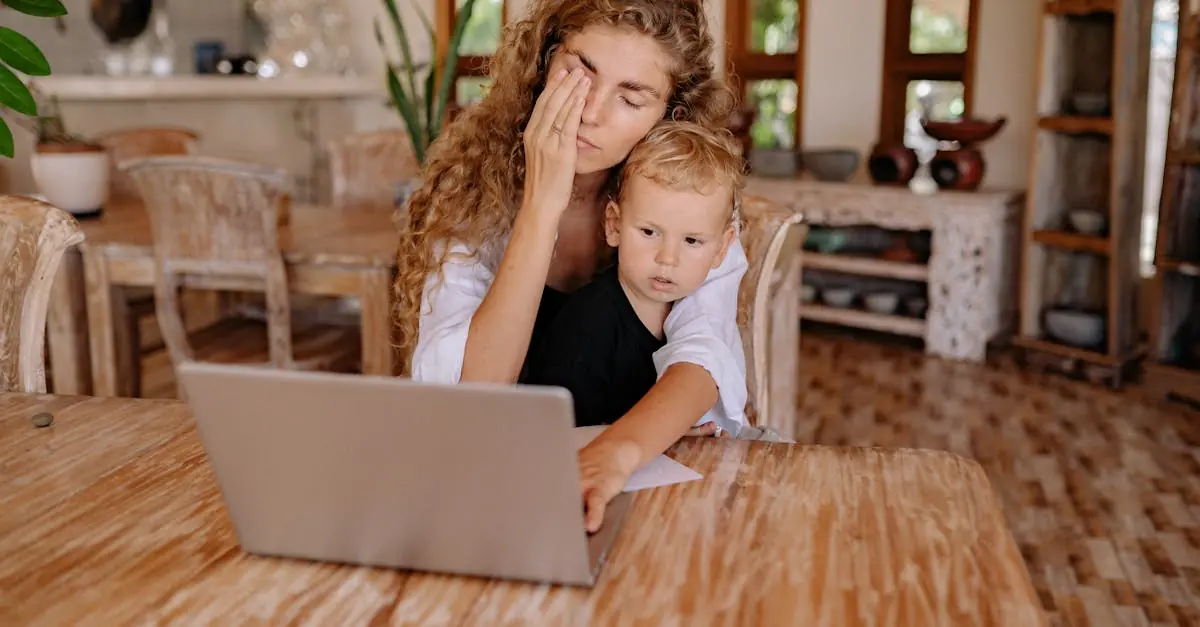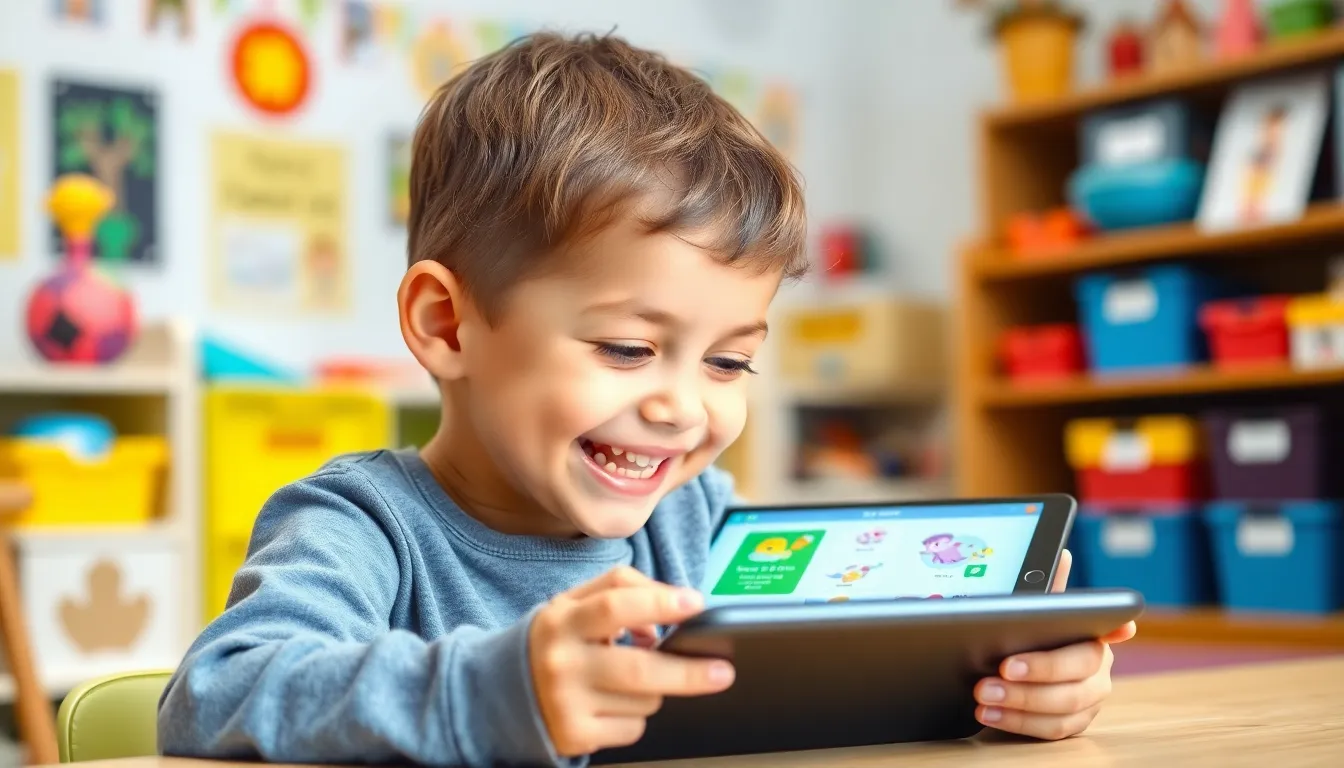Parenting can feel like juggling flaming swords while riding a unicycle—exciting yet terrifying. With toddlers throwing tantrums and teens rolling their eyes, maintaining emotional balance often seems like an Olympic sport. Yet, achieving this balance is crucial for both parents and kids. After all, a calm parent can turn a meltdown into a teachable moment faster than you can say “ice cream.”
Table of Contents
ToggleUnderstanding Emotional Balance In Parenting
Emotional balance plays a crucial role in effective parenting. Parents maintain calmness and composure to navigate challenges, transforming tough moments into learning opportunities.
Importance of Emotional Balance
Emotional balance fosters a nurturing environment. Parents equipped with emotional stability respond thoughtfully to children’s needs. Emotionally balanced parents model coping strategies, teaching children valuable resilience skills. Maintaining this balance reduces stress in family dynamics, enhancing overall well-being. Ultimately, parents who practice emotional balance contribute to healthier relationships within the family.
Effects on Parenting Style
Parenting styles significantly shift based on emotional balance. An emotionally stable parent encourages open communication, creating a safe space for expression. Contrarily, an emotionally reactive parent may resort to harsh discipline, harming the parent-child bond. When emotional balance is prioritized, parents use positive reinforcement more effectively. This approach nurtures trust and promotes a sense of security for children, leading to a stronger family connection.
Strategies for Achieving Emotional Balance
Prioritizing emotional balance leads to healthier family dynamics and stronger connections. Here are effective strategies to help parents achieve that balance.
Mindfulness and Self-Care Techniques
Practicing mindfulness enhances emotional awareness in parents. Techniques like meditation, deep breathing, and journaling effectively reduce stress. Incorporating five to ten minutes of daily meditation can bolster focus and calmness. Engaging in regular physical activity also promotes emotional health. Activities such as yoga and walking soothe the mind and body, allowing parents to model self-care for their children. Setting aside time for hobbies fosters joy and rejuvenation. Prioritizing self-care positively impacts overall family well-being, creating an atmosphere of emotional stability.
Setting Healthy Boundaries
Establishing healthy boundaries is crucial for maintaining emotional balance. Parents should clearly define expectations within family dynamics. Communicating limits encourages respect and understanding among family members. Consistency in enforcing boundaries fosters security for children. Additionally, parents can create time for themselves through designated family-free periods. Taking breaks allows for reflection and personal recharge, essential for effective parenting. Encouraging children to express their feelings within these boundaries promotes emotional literacy. Integrating healthy boundaries cultivates a nurturing environment, empowering families to thrive together.
Recognizing Emotional Imbalance
Identifying emotional imbalance in parenting is crucial for fostering a healthy family dynamic. Parents often experience signs that indicate distress.
Signs of Emotional Distress
Irritability stands out as a common sign of emotional distress. Frequent mood swings can disrupt family interactions. Overwhelm often leads to frustration, affecting a parent’s ability to cope effectively. Anxiety may manifest as excessive worry about parenting choices. Withdrawal from family activities might signal emotional imbalance, showcasing a need for help.
Impact on Children
Children absorb their parents’ emotional states deeply. Emotional instability in parents can lead to anxiety or behavioral issues in kids. They may feel insecure when parents react unpredictably. It’s common for children of emotionally distressed parents to struggle with self-regulation. Long-term exposure to this imbalance can hinder healthy development, creating challenges in forming relationships. Prioritizing emotional well-being allows parents to nurture resilience in their children, fostering a secure environment.
Developing Emotional Intelligence
Developing emotional intelligence plays a key role in effective parenting. Parents equipped with strong emotional intelligence create an environment conducive to their children’s growth.
Tools for Parents
Mindfulness practices significantly enhance emotional awareness. Meditation and deep breathing serve as powerful tools for calming the mind. Regular physical activity reduces stress levels, promoting a healthier emotional state. Keeping a journal allows parents to reflect on their feelings and reactions. Support groups provide community and shared experiences, helping parents navigate challenges together. Establishing clear routines supports emotional stability, making family life predictable and secure.
Encouraging Emotional Growth in Children
Modeling emotional expression is essential for children’s development. Children learn through observation, so parents should openly discuss emotions. Creating a safe space for expressing feelings promotes healthy communication. Encouraging problem-solving skills helps children handle their emotions effectively. Introducing books and activities focused on emotions fosters understanding and empathy. Acknowledging children’s feelings validates their experiences, strengthening their emotional resilience. Emphasizing teamwork in family activities nurtures collaboration and emotional bonds.
Conclusion
Emotional balance in parenting is essential for fostering a nurturing environment. When parents maintain their composure they not only navigate challenges more effectively but also model resilience for their children. This balance encourages open communication and strengthens family bonds.
By prioritizing self-care and mindfulness parents can create a stable atmosphere that supports emotional growth. Recognizing signs of emotional distress allows for timely intervention which can prevent long-term issues. Ultimately an emotionally balanced approach empowers families to thrive together, promoting healthier relationships and a deeper connection among all members.








